Estate Sales Chicago: Your Ultimate Guide to Successful Sales
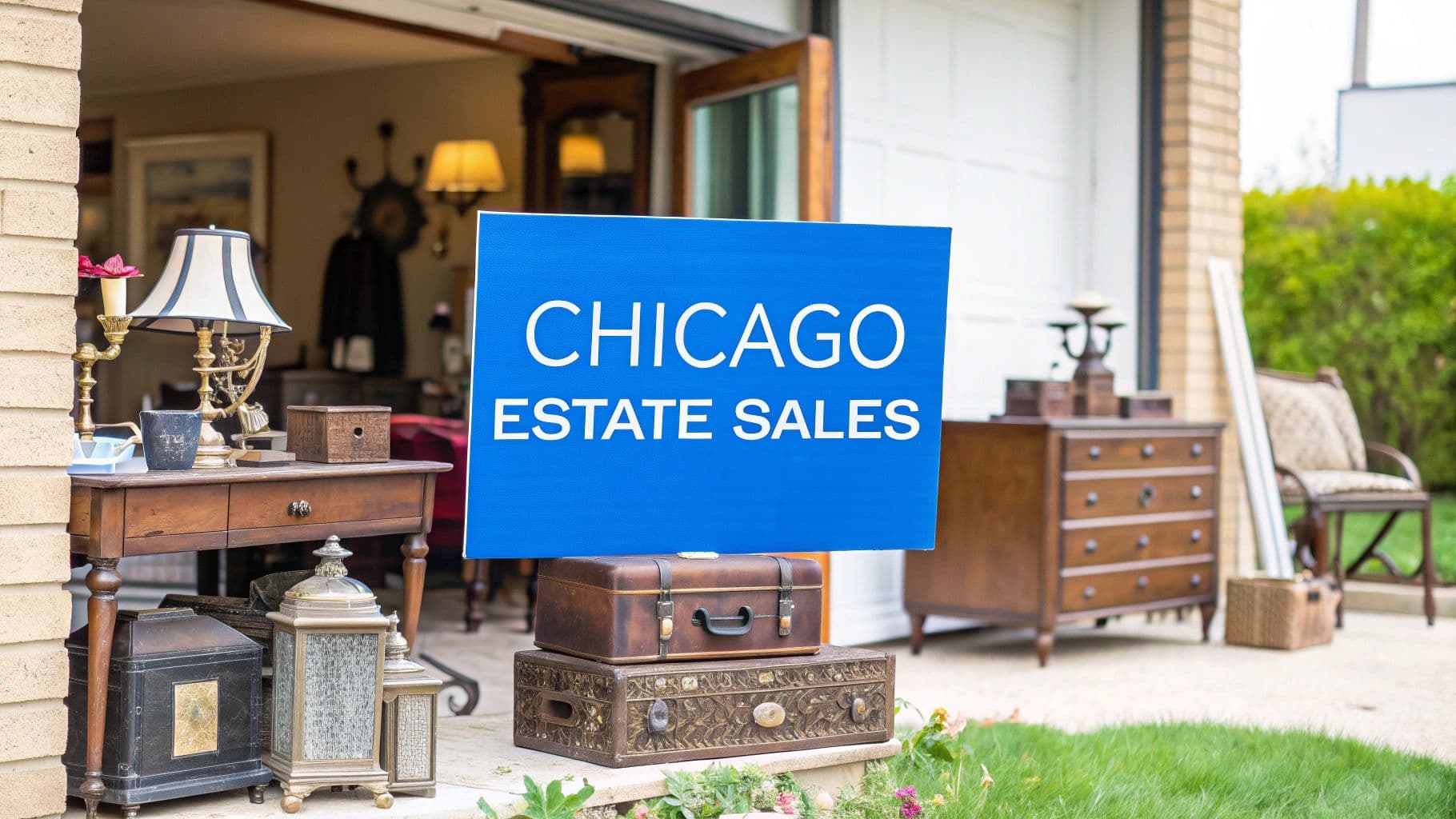
Running an estate sale in Chicago isn't what it used to be. The old-school method of just opening the doors and hoping for the best simply doesn't cut it in a city with such a fast-moving real estate market and so many distinct neighborhoods. To get the most out of a liquidation today, you need a smarter, more modern game plan that reaches the right buyers and presents your items in the best possible light.
Why Chicago Estate Sales Require a Smart Approach
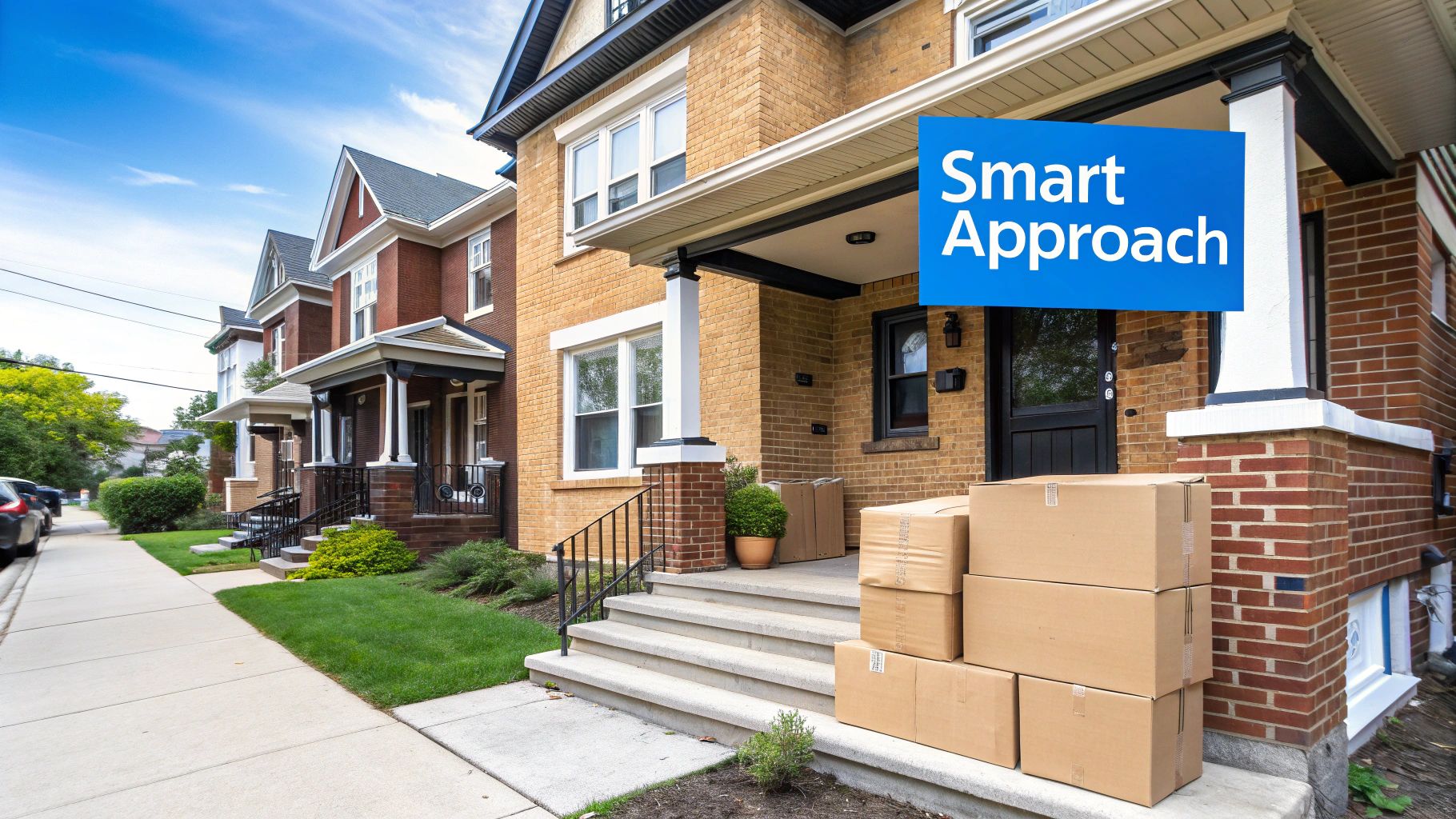
Whether you’re downsizing from a classic Lincoln Park brownstone, managing a loved one's belongings in Hyde Park, or selling everything to relocate from the suburbs, the objective is the same: turn assets into cash, efficiently. But the traditional route—hiring an estate sale company that pockets a hefty 35% to 50% commission—is no longer your only choice.
There’s a better way that puts you in the driver’s seat. Taking control means you can skip the massive fees and run the sale entirely on your schedule. In a city where timing is everything, this flexibility is a huge advantage.
The Financial and Emotional Stakes
Let’s be honest, clearing out a home is about more than just money. It’s an emotional process. Every single object holds a memory, and the pressure to make good decisions while dealing with it all can be overwhelming.
By managing the sale yourself with a platform like DIYAuctions, you're not just keeping a much bigger slice of the profits. You’re empowered to honor those memories while making the best financial choices for yourself. You call the shots on timing, pricing, and connect directly with buyers who will value your items. It transforms what could be a stressful ordeal into a rewarding, manageable project.
Navigating Local Nuances
Every Chicago neighborhood is its own little world. A sale in Wicker Park will likely pull in a crowd hunting for mid-century modern pieces, while one in historic Oak Park might attract buyers looking for unique architectural salvage. Knowing your local audience is crucial for marketing.
A DIY online approach also cuts through a lot of the red tape. Because the bidding and payment happen online, you sidestep many of the logistical headaches that come with holding a multi-day, in-person event. You can get a feel for the general guidelines by checking out our article on estate sale laws. This digital-first strategy lets you focus on what really matters: showcasing your items and planning a simple, one-day pickup.
Laying The Groundwork For Your Chicago Sale
The success of your estate sale in Chicago is decided long before the first bid comes in. Honestly, the real work happens upfront. This initial phase—where you take a hard look at everything in the home—is what sets the stage for a smooth, profitable auction.
It’s easy to feel buried when you’re sorting through a lifetime of belongings. To keep from getting overwhelmed, I always tell people to use a simple three-category system: sell, keep, and donate. It forces a clear decision on every single item, cutting through the clutter and preventing those "maybe" piles from taking over.
Creating A Manageable Inventory
One of the most critical steps is cataloging every single item you plan to sell. This inventory isn't just a simple list; it’s the absolute foundation for your auction. Skipping this or doing it poorly is a classic mistake—in fact, lawyers often point to failing to leave an inventory for loved ones as a major estate planning blunder.
Think about it this way: when you're listing a vintage dining set, you need to note the manufacturer, the exact condition, and how many chairs come with it. Getting these details right from the start makes building your auction lots so much easier later on.
To make sure you don't miss anything, our comprehensive estate sale checklist is a lifesaver. It’ll walk you through the entire process, step by step.
Setting A Realistic Timeline
You have to plan your timeline around Chicago’s unique rhythm. Forgetting this is a rookie mistake. For instance, trying to schedule item pickups near Wrigleyville during a Cubs game is just asking for a logistical nightmare. The same goes for a winter sale—you absolutely need a backup plan for snow and ice, which can make moving a heavy sofa nearly impossible.
My best advice? Give yourself way more time than you think you need. A good rule of thumb is to set aside at least two to four weeks just for sorting, taking inventory, and photographing everything before your auction even goes live. That buffer will save you from a ton of last-minute stress.
Choosing Your Sale Method
Once you know what you’re selling, you have to decide how you're going to sell it. In the Chicago market, you’ve basically got two options: go with a traditional estate sale company or manage the process yourself using a digital platform like DIYAuctions. The difference between the two is huge and directly impacts how much work you do, how much control you have, and how much money you walk away with.
Comparing Estate Sale Methods in Chicago
To make it clearer, let’s break down the key differences between hiring a company and doing it yourself with a modern platform.
| Feature | Traditional Estate Sale Company | DIY Online Auction Platform |
|---|---|---|
| Commission | Typically 35-50% of total sales | Fixed, lower commission (e.g., 10%) |
| Seller Control | Limited; company dictates pricing/staging | Full control over pricing and listings |
| Timeline | Can take weeks or months to schedule | Flexible; launch your sale in days |
| Buyer Reach | Local foot traffic on specific sale days | Broader local online audience |
| Effort Required | Less hands-on work for the seller | More seller involvement in cataloging |
| Transparency | Varies; fees can be complex | Clear, upfront terms and earnings |
The takeaway here is pretty clear: while traditional companies handle more of the labor, it comes at a steep price, eating heavily into your profits. A DIY approach puts you in the driver's seat and lets you keep the lion's share of the earnings.
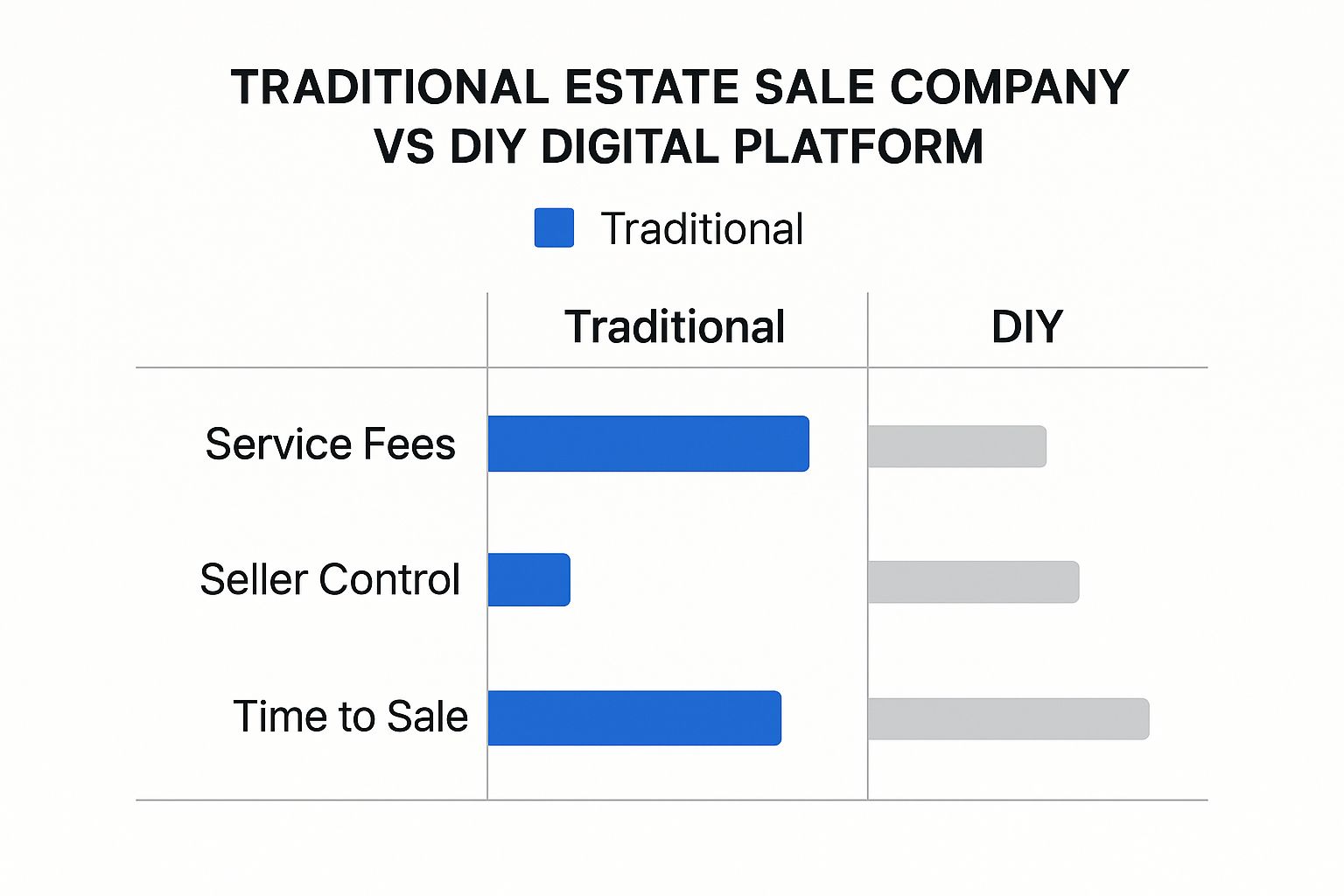
This decision is especially important right now. The Chicago housing market is hot, with the typical home value now at $312,025, which is up 1.5% over the past year. With home values climbing, it’s more critical than ever to maximize the return you get from everything inside the home.
How to Stage and Photograph Items Like a Pro
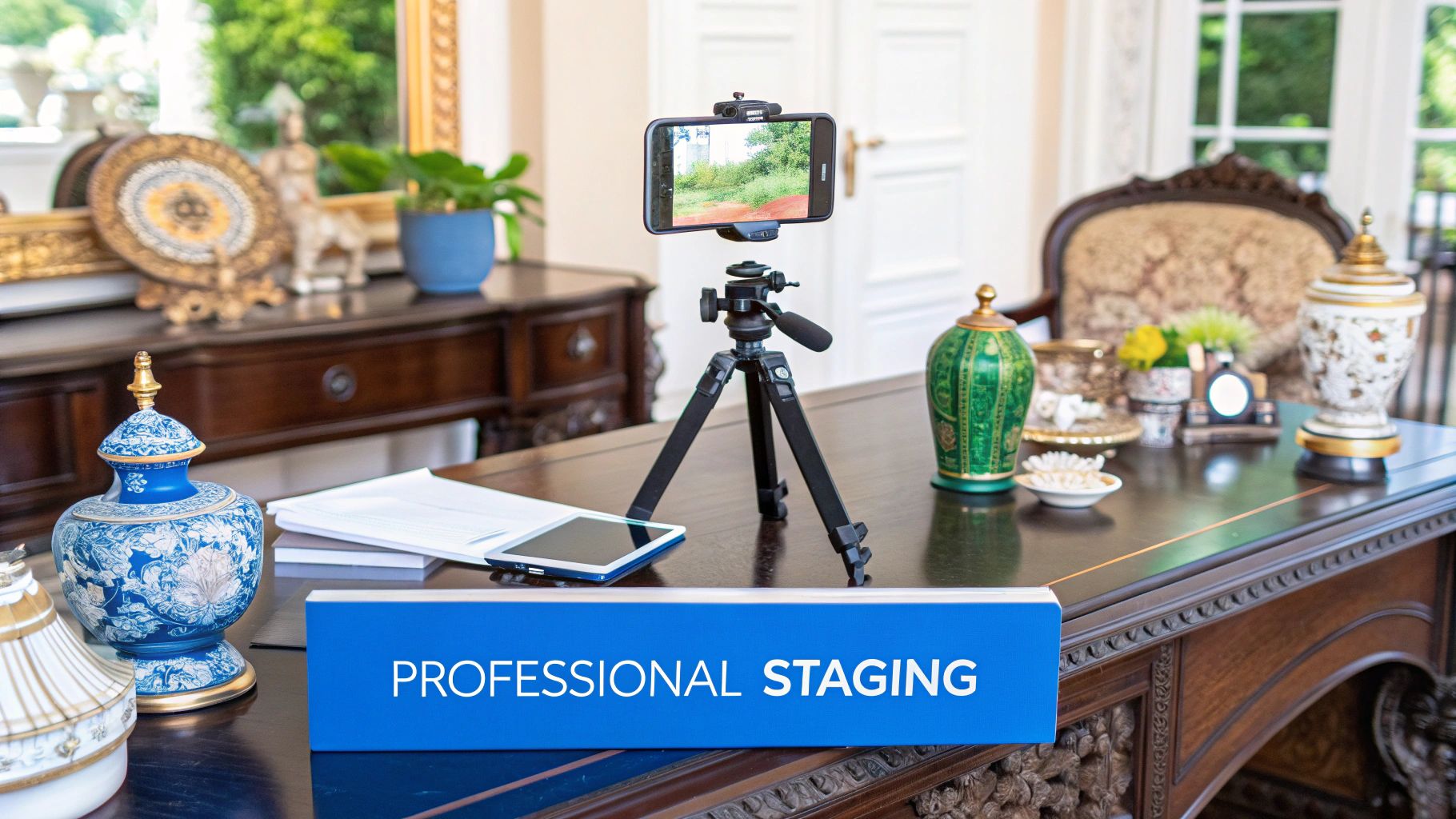
Here's a hard truth: how you present your items in an online auction can make or break your final sale price. Great photography isn't just for the pros; it's the single most powerful tool you have to get bidders excited and drive up the price. Think of each listing as its own little storefront.
You don't need a fancy camera. The smartphone in your pocket is more than capable of taking amazing, sale-worthy photos. The secret is all in the prep work. Before you snap a single picture, give every item a good cleaning. A dusty bookshelf or a smudged piece of glassware immediately lowers its perceived value.
Creating the Perfect Shot
The absolute first rule of good item photography is finding good, natural light. It’s a game-changer. Set up your items near a big window, but try to avoid that harsh, direct sun that casts dark shadows. An overcast Chicago day is actually your best friend here—it gives you soft, even light that shows true colors and details perfectly.
Next, get that background right. You need something simple and uncluttered. A plain wall, a solid-colored sheet you can drape over a chair, or even a big piece of poster board from the craft store works wonders. Your goal is to make the item the hero of the photo, not the clutter behind it.
Pro Tip: For smaller, high-value items like jewelry or collectibles, you can easily create a "lightbox" effect. Just grab three pieces of white foam board and place them around the item. This simple trick bounces soft light all around the object, getting rid of shadows and making those fine details pop.
Telling a Story with Your Photos
Your photos need to do more than just show an item. They need to tell its story and build a bidder's confidence. For any online auction, especially one aiming for savvy estate sales Chicago buyers, the details are everything. My advice? Always take more photos than you think you need.
Here are the must-have shots for almost any item you list:
- The "Beauty Shot": This is your main event. Your cover photo. Show the entire item from its most flattering angle.
- Detailed Close-Ups: Get in close on unique features. Think wood grain, a specific fabric texture, or intricate carvings.
- Signatures & Markings: This is non-negotiable for antiques, art, or designer goods. Capture any maker’s marks, artist signatures, or brand labels. This is proof.
- The Scale Shot: Give bidders a sense of size by placing a common object, like a can of soda, next to the item. It clears up any confusion.
- Flaws & Imperfections: Be honest. Photographing any scratches, chips, or wear builds trust and prevents headaches and disputes down the road.
Remember, compelling visuals are what stop the scroll and get people bidding. You can find some essential real estate photography tips that apply perfectly here. By treating each piece with this level of care, you're not just selling an object—you're selling its value.
Marketing Your Sale to Find the Right Chicago Buyers
Once your items are staged and photographed, it’s time to get the word out. This is where the magic happens. Great marketing is what connects your carefully curated auction with eager Chicago buyers, and it’s about much more than just putting up a listing. You need to reach the right people in the right places.
Fortunately, when you use a platform like DIYAuctions, a lot of the heavy lifting is already done for you. Our system automatically markets your sale to a built-in network of local buyers who are actively searching for estate sales in Chicago. This means your items get in front of people who are genuinely interested, not just random browsers.
But you can take it a step further. A little local effort can seriously amplify your reach. Think about what you're selling. Got a killer collection of vintage jazz records? A quick post in a local vinyl enthusiast Facebook group could spark a bidding war. Selling some incredible Art Deco furniture? Mentioning it in a forum for Chicago architecture buffs might attract serious collectors who know its true value.
Tapping Into Chicago's Niche Communities
Every neighborhood in Chicago has its own vibrant online community. We're talking about the "Lincoln Park Moms" group, the "Logan Square Curated" marketplace on Facebook, and dozens of others. These hyper-local spaces are absolute goldmines for finding buyers.
A simple, well-crafted post can work wonders. Just make sure to include:
- A brief, exciting mention of your estate sales Chicago event.
- A direct link to your online auction page.
- One or two of your absolute best photos to grab immediate attention.
This simple strategy puts your sale right in front of people in your immediate area, which is a huge advantage when it comes to coordinating an easy pickup day. To really dig into this, check out our guide on digital marketing for local businesses.
Crafting Compelling Item Descriptions
Think of your item descriptions as your digital sales pitch. This is your chance to use the specific keywords that real buyers are searching for. Don't just list an "old chair." Instead, write "Mid-Century Modern Eames-Style Lounge Chair." Get specific about the materials, dimensions, and condition—don't be afraid to point out flaws, as it builds trust.
Key Takeaway: Put yourself in the buyer's shoes. What words would you type into a search bar if you were looking for your item? Use those exact words in your title and description. It’s a simple change that helps your items get found and attracts bidders who know exactly what they want.
It also pays to understand the local market. Recent data shows that while a huge majority of Chicago homebuyers (81%) are looking to stay right here in the area, a lot of people are also moving away. Your marketing can appeal to both—the established local collectors and those looking to furnish a new home somewhere else.
By combining the automated marketing power of DIYAuctions with these smart, local tactics, you’re creating a powerful strategy to make sure your items fetch the best possible prices.
Managing Your Auction and Coordinating Pickups
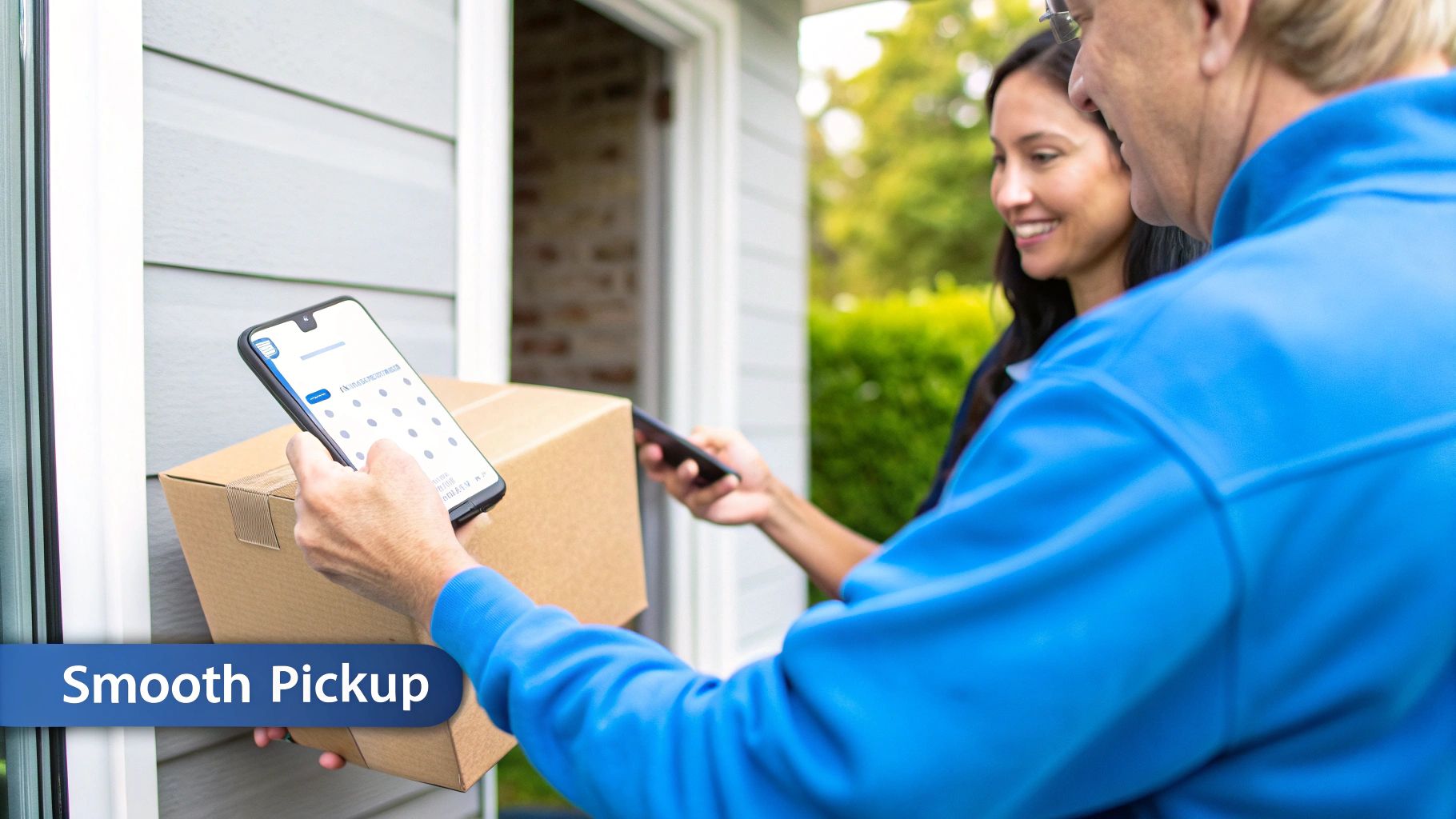
Once your auction is live, all that prep work really starts to shine. Now, your role shifts from planner to manager. It’s less about the heavy lifting and more about being a responsive, professional host for your sale.
During the auction, you'll want to keep an eye on the bidding and be ready to answer questions. People always have them. They might ask for an item's dimensions, need a photo from a different angle, or want to clarify the condition. Getting back to them quickly with a friendly, honest answer builds trust and often leads to more confident bidding. It’s a small thing, but it makes a huge difference.
Navigating Post-Sale Logistics
When the timer hits zero and the auction closes, your focus pivots to the most critical logistical piece of any estate sales Chicago event: the pickup. This is where your organization skills are put to the test, especially in a city with tight parking and narrow streets. A chaotic pickup can quickly sour a great sale.
The secret to a smooth pickup is all about communication and scheduling. While DIYAuctions gives you the tools to manage this, adding a personal touch goes a long way. The goal is to create a calm, orderly flow of people, not a free-for-all.
Your pickup day isn't just about handing off items; it's the final customer service touchpoint of your sale. A well-organized pickup ensures a positive end to the transaction, encourages good reviews, and builds a great reputation for any future sales.
This is especially true right now. The Chicago real estate market is moving fast, with active home listings jumping nearly 20% in just four months. You can see the trends in Chicago’s housing market data. A quick and efficient clean-out is more important than ever for sellers trying to get a property on the market.
Your Pickup Day Checklist
To head off any logistical headaches, you need a clear plan. Try to think through every step from the buyer's point of view. What do they need to know to make their experience seamless?
Here’s a practical checklist to make sure your pickup day is a total success:
- Schedule Pickup Times: Don't let everyone show up at once. You can use a free tool like Calendly or even a simple shared spreadsheet to let buyers book a specific 15 or 30-minute slot. This is a game-changer.
- Provide Clear Instructions: Send winning bidders an email with the full pickup address, their scheduled time, and crucial details about parking or building access. Think things like, "Please use the alley entrance," or "The freight elevator must be reserved in advance."
- Verify Payments First: Before a single item walks out the door, double-check that payment has cleared through the platform. This simple step protects you from any last-minute payment trouble.
- Organize Items for Easy Access: Before anyone arrives, group items together by buyer invoice number. Stage everything near the exit to make the handoff quick and painless for everyone.
- Remind Buyers to Come Prepared: In your instruction email, gently remind buyers they are responsible for bringing their own help for heavy furniture, plus any packing materials they might need, like boxes or moving blankets.
By managing these final steps with care, you’ll wrap up your sale with confidence, knowing you’ve handled every detail like a true pro.
Common Questions About Chicago Estate Sales
Even with the best plan, you're bound to have questions pop up when you're running your own estate sales Chicago event. Things like permits, pricing, and city logistics can feel like a maze, but the answers are usually more straightforward than you’d think. We’ve pulled together the most common questions we hear to give you clear, practical answers.
Do I Need A Permit for an Estate Sale in Chicago?
This is a big one, and the answer is usually no. For a one-time estate sale at a private home, the City of Chicago generally doesn't require you to get a special permit. They’ve set it up to avoid creating extra headaches for homeowners just trying to liquidate personal property.
There is one small catch, though. If you're in a condo or a building with a homeowners association (HOA), they will almost certainly have their own rules. It’s always smart to check with your building management first about their policies on moving, signage, and guest traffic.
This is exactly where an online auction platform like DIYAuctions gives you a massive advantage. Since the sale itself is virtual, you sidestep most of those concerns and only have to manage the logistics of a single, private pickup day.
How Should I Price Valuable Items for the Chicago Market?
Pricing antiques, art, or designer furniture for a savvy Chicago audience can feel a bit daunting. The good news is, you have some great resources right at your fingertips.
Your first move should be a bit of research. Websites like WorthPoint or LiveAuctioneers are goldmines of information, showing you what similar pieces have actually sold for recently. This gives you a real-world baseline to work from, not just a guess.
If you have items with local historical ties or anything you suspect is particularly valuable, spending a little on a quick online appraisal can give you both peace of mind and an official valuation to show potential buyers.
A pro tip for online auctions is to start with a low opening bid. It might feel counterintuitive, but this encourages more people to jump in and start bidding. That competition is what naturally pushes an item toward its true market value. And always, always photograph any signatures, maker's marks, or certificates of authenticity—it’s the key to building bidder confidence.
What Is the Best Way to Handle Large Furniture Pickups?
Logistics are king in a city like Chicago, especially if you're in a multi-unit building. A smooth pickup for that giant sofa or dining set comes down to two things: communication and scheduling.
Before your auction even goes live, get the rules from your building. You need to know:
- Moving Hours: Are there specific times of day when moves are even allowed?
- Elevator Reservations: Does the freight or service elevator need to be booked in advance?
- Loading Dock Access: Where can people park? Are there time limits?
Once you have those details, schedule your winning bidders in staggered, 30-minute time slots. This prevents a traffic jam in your lobby or driveway. Make sure you clearly communicate all of this to your buyers. A simple reminder for them to bring their own help and moving supplies is crucial—you’re the sale manager, not their moving crew.
What Can I Do With Items That Don't Sell?
It’s totally normal to have a few things left over when the auction closes. Don't sweat it. The beauty of a flexible platform is that you have a few easy options.
You could quickly relist the items in a new auction, maybe grouping them into a "lot" or starting with an even lower opening bid to spark interest.
If you’re ready to just be done, donation is a fantastic route. Many Chicago charities, like The Salvation Army or Brown Elephant, offer free pickup services for furniture and other large household goods, making it incredibly easy. For anything left that can't be sold or donated, a local service like Junk Removal Chicago can handle the final clean-out for you.